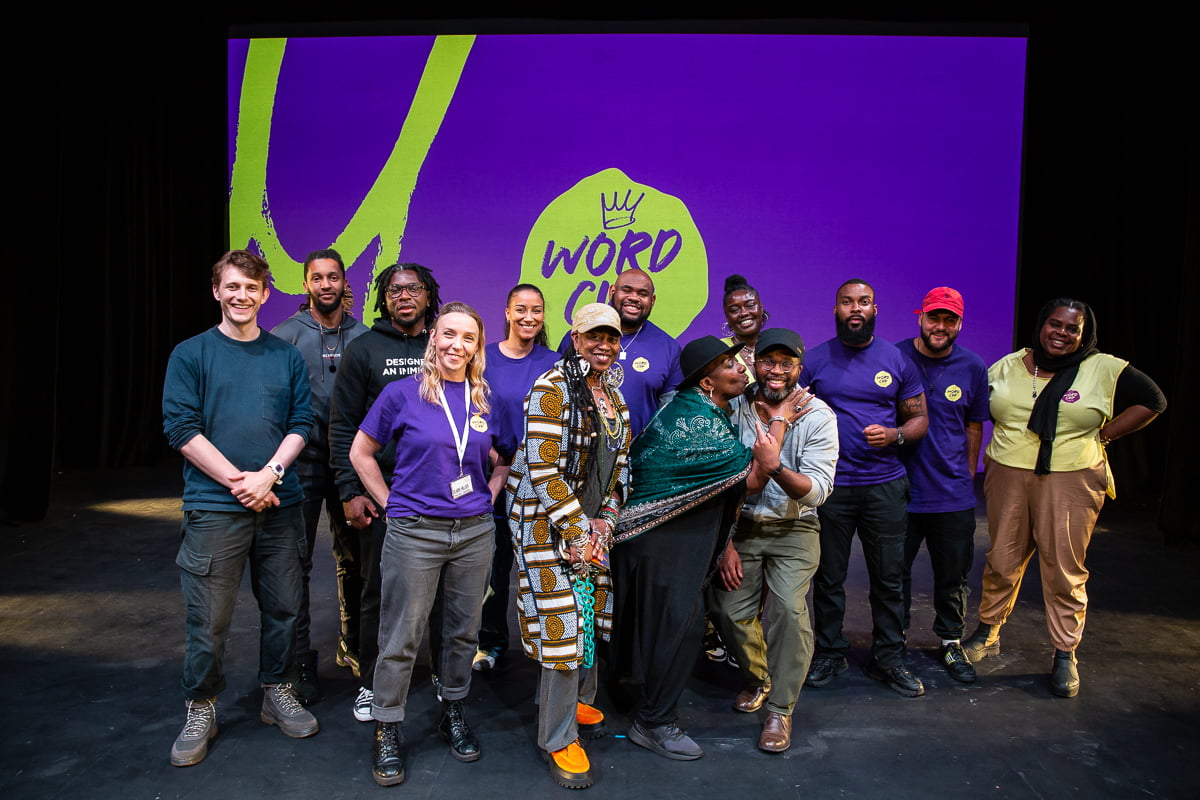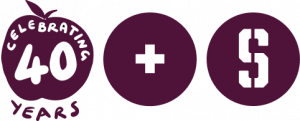
WORDCUP ’14 – ’23
The Woods of Writing
As a poet who has reached a decade into this line of life (I’d call it work, but poetry is something lived, isn’t it?) I have found myself reflecting on the journey, the path from Shadow to Poet Coach.
Over this decade, I have facilitated poetry in schools, universities, care homes and art institutions, working in a space with many different folks who are all on their own path with writing. I’ve come to learn that a facilitator is a guide that we all meet on our respective paths; a guide that points out the interesting routes we can take through the woods of writing. It’s not our job to say which steps to take, more to encourage one’s curiosity at the possibilities of their decisions. Through this process of permission and risk, we connect and build trust to whoever we work with and owe, in part, where we end up further along the path.
Apples and Snakes, their opportunities, empowerment, and advocacy for those interested in writing, performing and collaboration, are instrumental in showing me and guiding me along this path as a facilitator and in turn, furthering the possibilities in my life as a poet.
On Stepping into the Role of Shadow – WORDCUP 2014
The one benefit of an uncleared email inbox is it still holds my correspondence from 2014; a window in time that looks back to my fledgling poet-facilitator-self. In a thread, I am talking with Daisy Dockrill, a former Apples and Snakes project coordinator. She encouraged me to apply for the role of Shadow Facilitator on WORDCUP14, an inter-school slam taking place in London that summer. I was lucky enough to be selected and it was the first opportunity I had to work on a sustained, longer-term programme to deepen my understanding of teaching poetry and performance in schools and a chance to learn from an established poet.
I was partnered with poet Indigo Williams who ran a writing club at St. Gabriels in Kennington. The writing club was a potent mix of students who absolutely wanted to be there and those who were challenging themselves beyond the expectations of their school.
Each week I learnt the fluidity that a facilitator needs to address the complexities that young people face, how a session’s time can fall away so quickly whilst you encourage the young writer through their anxieties and build their confidence in taking their steps through the woods of writing.
Being a stranger and a new face to the members of the club, I learnt how to mediate my presence, respect their boundaries, and started to get a footing on how to offer ideas and suggestions to them, encouraging the early awareness of receiving critique and feedback on writing. Having studied Creative Writing at university and participating on the Barbican Young Poets and Roundhouse Collective programmes, I enjoyed the challenge of reshaping what I knew so that it was accessible and inspiring; so that it could guide the way for the young writer, rather than meet some pre-conceived idea of what a poem should be.
Indigo was the perfect mentor in supporting my learning: setting debriefs post-session, modelling her different approaches and detailing what she had expected to happen versus what came to be in session. Her balanced method of encouraging these young writers through the trust they had built in connection, and then pushing their abilities with her understanding of poetic craft and performance continues to influence me.
Part of the shadow experience is deepening your understanding of your own tools, so that they may be embodied once you’re leading sessions; every aspect of the WORDCUP14 programme reinforced this understanding. When it came to the interschool slam at the end of the project, I found myself in awe of the shared journey I, the young writers and Indigo had embarked on. As they brought their writing into the live setting and performed in front of other schools, I witnessed their growth and felt how far along the path I had come.
On Stepping into the Role of Poet Coach
In 2023, nine years later, the opportunity rises that I can contribute to WORDCUP23, in the role of the Poet Coch, working with Hampshire-based writer development agency ArtfulScribe and young writers from Hounsdown School. I’ve walked the path long enough to step into this role and this is a full circle moment of sorts – though the learning and journey continues.
What is humbling about facilitating as a Poet Coach is, the challenges and joy of working in the WORDCUP23 sessions are the same as when I started along this path with Indigo. The young writers require a similar level of encouragement and guidance, of openness and permission to risk and fail together – in order to then find the right shape and words for our poems.
Writing group poems required us to set agreements with each other; all suggestions and decisions made in the writing were for the betterment of the poem, as opposed to us as individual poets/people. This nurtured a rich level of challenge and reward to our understandings of poetic craft. I found that this required a similar level of building trust with the young writers in the groups, so that we could carefully tread the woods of our writing and find the right words along the way.
As the Poet Coach, I also felt the weight of responsibility to my writing and facilitation tools, of ensuring we reached checkpoints on the road to the national WORDCUP Celebration that had to be met. This further challenged my fundamentals as a facilitator and artist – I’ve always wanted groups to self-lead, to have as much agency in what they make as possible, as a way of understanding the creative process – but this was in tension with the idea that they needed to complete their group poems together and be at a point of sharing. I also had my own Shadow, poet Claire Hillier, to support too (though in this iteration of WORDCUP they were called ‘Assistants’) which further developed my practice – the responsibility of debriefing and guiding, of open-sourcing my knowledge and tools for someone else to learn and embody for their own purpose as a facilitator.
Leading on WORDCUP23 empowered the opportunity to steer our direction along the path whilst doing my best to involve the group, Claire and our supporting teachers, in choosing the routes we took. These lessons are clear, joyful checkpoints in my own journey along the path as a facilitator.
At the WORDCUP23 showcase, I was humbled by how far the Hounsdown young writers had come after working with them for 3 months. We cultivated a fire and poetic eagerness in them that meant they were able to take on lessons from the development sessions across the weekend and reshape their group poems in the final hours prior to their sharing. Both groups gave the best performances of their work to date in their respective moments in the showcase and each young writer was a proud beacon of poetic light all the way home from the weekend in Manchester to Southampton.
As a Poet Coach, I felt my own poetic practice reflected in the group’s approach; that willingness to reshape what you’ve made in the last moments before sharing. It keeps the poetry live and charged! I felt that sense of pride that I had authentically shared my tools and approach as a poet and artist, that I had shown a path for these young writers to try. Their light will guide my next decade through the woods of writing.
About Antosh Wojcik

Antosh Wojcik is a poet, drummer and sound designer. His writing explores memory, time, heritage and glitches. His drumming and spoken word show, How To Keep Time was produced by Penned in the Margins and toured internationally in 2019, supported by Arts Council England. He co-wrote and sound designed the BFI short film ‘Alo’ with Xenia Glen in 2023. His poems have been published in bath magg, Anthropocene and anthologised by Bad Betty Press and Colliding Lines.
IG @_weirdtoday
Twitter @antoshwojcik
